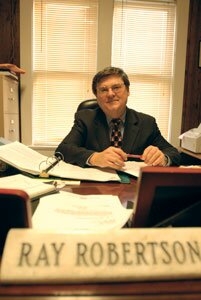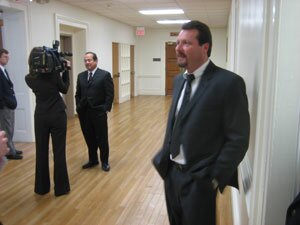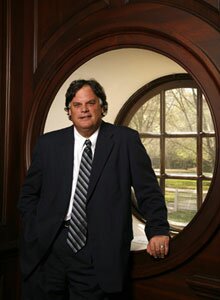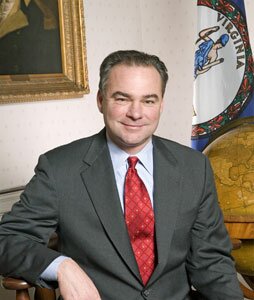COVER- Virginia is for... puritans: The fight over sex, nudity, and the First Amendment

All over Virginia, there are women hanging around government buildings brazenly baring their breasts. In libraries, assembly halls, even inside the DMV, the naked bosoms are downright unavoidable. The ubiquitous nudity can even be found in the schools, out in the open, in front of children as young as six years old. And there's one woman behind it all.
She is known simply as Virtue, and while she may not be a household name, hers is clearly the Commonwealth's most memorable mammary. She's the triumphant woman on the state flag, her left foot atop an anonymous king's dead body, her left hand clutching a sword, and her left breast fully exposed.
Virginia is the only state in the union to feature any kind of nudity on its flag, yet lately the Old Dominion seems to be one of the states least comfortable with showing skin anywhere else. In courtrooms across the Commonwealth– with Virtue's voluptuousness visible in every one of them– and in the court of public opinion, people from small-time merchants to big-time college presidents are being tried for being too frank about, too permissive of, or too explicit in depicting sex and the naked body.
As statewide attitudes toward social freedoms are supposedly becoming more liberal, and its voting patterns more blue (just ask Mark Warner, Tim Kaine, or Jim Webb), what's got Virginia turning red?
Virginia v. lovin'
Contrary to the popular slogan, Virginia hasn't always been for all of its lovers. The state has a long history of attempting to regulate consensual sex. In 1778, Thomas Jefferson himself proposed that sodomy (understood then and now to mean any sexual act that could not result in procreation) "be punished, if a man, by castration, if by a woman, by cutting thro' the cartilage of her nose a hole one half inch diameter at the least." (This was just two years after he composed the Declaration of Independence.)
While Jefferson's perhaps cruel and definitely unusual idea was never made law, plenty of other sex-related bills did make it onto the books and stayed there until very recently. In 1924, the General Assembly passed the "Racial Integrity Act," prohibiting interracial marriage. It took a 9-0 Supreme Court decision in the 1967 case of Loving v. Virginia to allow the District of Columbia marriage between Caroline County's Mildred Jeter (an African-American and Rappahannock Indian woman) and Richard Perry Loving (a white man) to be recognized as a legal union, thus striking down all anti-misegenation laws as unconstitutional.
By 2005, sodomy among consenting, unmarried adults (even an adult consenting to sex with himself) was still a crime punishable by up to five years in prison. That's when Muguet Martin successfully sued her ex-boyfriend Kristopher Ziherl in Richmond Circuit Court for giving her herpes through unprotected sex when Ziherl knew he was infected with the virus and didn't tell her.
Ziherl appealed the ruling on the basis that Martin could not collect damages based on their sexual relationship, because the two were not married and thus their having sex was an illegal act. When Judge Theodore Markow sided with Ziherl, Martin's appeal went to the state Supreme Court, where a unanimous court ruled the statute unconstitutional and scrapped Virginia's centuries-old sodomy law.
Of course, while gays and lesbians across the Commonwealth are now free to mind their own business in the bedroom, they just can't do it without living in sin. In 2006, Virginia voters overwhelmingly approved a constitutional amendment not only defining marriage as being between a man and a woman, but also precluding the state or any locality from "creat[ing] or recogniz[ing] a legal status for relationships of unmarried individuals that intends to approximate the design, qualities, significance, or effects of marriage," without making any distinction of whether those unmarried individuals are straight or gay.
The city of Staunton voted almost identically to the rest of the state, with 56 percent of its electorate voting in favor of the amendment, compared to 57 percent statewide. And while the Shenandoah Valley town's attitudes may have been the norm on the issue of men lying down with mankind as with womankind, its prosecutor is the vanguard of opposition to films of people lying down with anyone.
After Hours, before the flood
In October, an adult video store called After Hours Video opened in a largely residential, but nevertheless out-of-the-way location in Staunton. Less than a month later, Staunton Commonwealth's Attorney Ray Robertson hit its owner, Rick Krial, with 12 counts of obscenity, eight of which were felonies, for selling 12 DVDs to undercover police officers on four different occasions. Then in January, Robertson filed 10 more obscenity counts against the store's cashier Tinsley Embrey for being the one to actually sell the officers the porn.
On Thursday, March 6, Staunton found out this is only the beginning. Judge Thomas Wood set Krial and Embrey's trial date for June 17, but this saga could have multiple sequels, as this first trial focuses only on the first four of the combined 22 charges currently facing the store owner and his employee, leaving open the possibility of three or more additional trials– all based on the purchase of less than two dozen DVDs. Why so many trials?
"You're dealing with 24 hours' worth of porn," answers Robertson. "If you require a jury to watch all that, they could become bored or desensitized to these acts."
In light of this prospect, Robertson proposed to Judge Wood that the prosecution choose two movies to be representative of the other 10 purchased by Staunton police.
"They decided how many movies to purchase," says Krial attorney Paul Cambria, a Buffalo-based obscenity lawyer made famous by 30+ years of courthouse arguments on behalf of Hustler publisher Larry Flynt. "We're the ones disadvantaged by multiple trials because of the incredible expense to my client."
Fellow former Flynt attorney Louis Sirkin, who is defending cashier Embrey, believes that Robertson's proposal of trying all the charges on the basis of one or two representative videos was downright unconstitutional.
"Each of these movies is presumed not to be obscene," the Cincinnati-based Sirkin said. "We're not willing to say if you find two obscene, the other 10 are obscene. You're taking away that presumption, and that's a chilling effect. If [the prosecutors] feel it's a handicap, they chose their own handicap."
While Judge Wood agreed that multiple trials were cumbersome, he informed the out-of-town defense attorneys, "The Commonwealth is normally entitled to a great deal of discretion, and I'm not in a position to order them otherwise."
Robertson eventually decided to throw out the other two videos from the first purchase for now, and instead focus this initial misdemeanor trial on two titles: Sugar Britches and City Girls: Extreme Gang Bangs.
Addressing reporters afterward, Sirkin said that while he wasn't happy with the need for multiple trials, "I hope jurors remember that Virginia was one of the original 13 colonies, and the importance of the American way, and the liberties people came here for in the first place."
Meanwhile, prosecutor Robertson said that multiple trials were not only necessary, but more practical.
"My thoughts are that I would be totally disgusted and sickened, and upset with somebody if I were a juror having to watch all this," he said. "This way, it's only four hours, and they'll definitely get an idea of it."
Robertson admits he has watched all 24 hours of porn the police purchased, and has not been shy about offering explicit description. In December he told the Hook, "I'm going after things like double penetrating women, slamming them in both orifices, multiple strangers ejaculating on the faces of women." In January he said, "In just about every one of these things, you'll see one guy inserting his penis into a woman's vagina, and another guy inserting his penis into her anus, and then that guy puts it in her mouth, again, and again, and again."
Asked why he speaks of the case in such graphic detail, Robertson said, "Why not? You need to know what you're dealing with. Nobody's attempting to gross anybody out. The jury is going to be required to look at it, and people need to know what this is."
As for what will happen to the other 18 obscenity counts if Krial and Tinsley are acquitted in the first trial, Robertson said, "I'm not going to give up after one."
Robertson is not the only prosecutor trying After Hours. Matthew Buzzelli is a member of the federal Obscenity Prosecution Task Force whose services are on loan to Robertson from the Justice Department. While the federal government has no jurisdiction, the Justice Department volunteered Buzzelli, he says, because of Staunton's relative proximity to Washington.
"If this were in Alaska, I probably wouldn't be doing this," says Buzzelli, "but we have the resources in terms of what kinds of briefs to file, arguments, motions, instead of Mr. Robertson having to reinvent the wheel."
Sirkin said he's only seen a federal prosecutor involved in a state-level obscenity case "once or twice in my career" and wondered if the DOJ didn't have better things to do.
"I find there are much more important problems," he said, "like how people from the White House won't testify before Congress. But here they are worried about the sale of videos to consenting adults."
Buzzelli emphasized that he was not brought in as a ringer to even the playing field against Krial and Embrey's nationally-renowned counselors.
"Mr. Robertson is a capable lawyer," he said. "He's been prosecuting for over 30 years; he can handle these guys."
All parties are due back in court on May 27 at 8:30am for a hearing on additional pre-trial motions.
By that time, the Commonwealth could have another complex case of sex, eyes, and digital videotape to prosecute.
PDA on PDAs
Around the time After Hours Video had opened in Staunton, kids across the country were abuzz with a different skin scandal. Vanessa Hudgens, the then-18-year-old star of the Disney's Channel's popular High School Musical made-for-TV movies, had taken a few nude pictures of herself using a webcam, she says solely intended for private use, and they somehow ended up on the Internet.
Many speculated that the pictures would mark the end of Hudgens' involvement with the squeaky clean High School Musical franchise, not to mention lucrative endorsement deals with Neutrogena and Old Navy. However, once she issued a near-immediate public apology, the sponsors held fast, and Disney released a statement saying, "Vanessa has apologized for what was obviously a lapse in judgment. We hope she's learned a valuable lesson."
By January, Disney had confirmed to Hollywood trade publication Variety that Hudgens will return to star in High School Musical 3: Senior Year, due to air in October.
As it turns out Hudgens wasn't the only teenager with a digital camera and an imagination. Around that same time, Bedford County Assistant Commonwealth's Attorney Wes Nance first heard of an emerging trend in his just-outside-Lynchburg jurisdiction.
"Since the fall, we've heard of three instances of children as young as middle schoolers who will take naked pictures of themselves with their camera phones and send them to each other," he says. "It's a trend that's becoming more and more frequent."
While Nance handled two of the cases without criminal charges, in a third he found it necessary to charge two teenagers– both juveniles– under the state's child pornography statute.
"If children are taking a picture of themselves, they are producing child pornography. If they send it to someone else, they are distributing child pornography. If that child then receives the picture and doesn't delete it immediately, that child is possessing child pornography," he says.
Nance emphasizes that he takes each incident on a case-by-case basis, and that while he wouldn't go into the specifics of the pending charges, he did offer hypothetical criteria.
"Most of the cases we've seen, a middle schooler will take a picture of themselves, send it to the person with whom they are romantically involved, then there's a disagreement between them, and the picture gets sent to a third party," Nance explains. "If a high school senior solicits that kind of picture from a middle schooler, that has much more serious ramifications, and that's going to be handled differently than someone sending a picture to the person they're romantically involved with."
According to UVA adolescent psychologist Peter Sheras, it's natural for pubescent children to experiment with expressions of sexuality.
"There is a tendency for middle-school aged kids to act out as a result of what's happening with them biologically, and challenge the boundaries of appropriateness without it necessarily being a willful act of deviance," he says. "This kind of thing is not unheard of."
Further, Sheras says he's seen instances of middle school students exploring their changing bodies in far more shocking ways.
"I hear about sex parties," he says, "things that consist of acts we would consider to be much more adult than just hugging or kissing."
Nance says he is trying to be extra careful to make sure that the punishment will fit the crime in combatting the issue.
"Prosecution is not the end game," he says. "We understand these kids are in some way inadvertently victimizing themselves, and we take that into account. Once charges are brought, there's a wide range of ways we could handle this. It will ultimately be up to the judge, who has the discretion to decide the punishment, the permanency on their records, and if they will have to register as sex offenders."
Children registering themselves as convicted sex offenders?
"The Commonwealth," Nance says, "can either request it or not request it."
According to attorney John Whitehead, who made his name by taking on religious freedom cases in schools as the founder of the Rutherford Institute, but has since expanded the civil liberties group to take on more secular issues, the inappropriate photography is not the problem, but rather a symptom thereof.
"I'm not sure it's wise to give kids a record, but it illustrates that kids have no limits," says Whitehead. "In the old days, kids had a sense of right and wrong. I talk to kids at UVA, and find that kids just don't know any better anymore, and that the way corporate America pushes sex in their advertising has really affected people."
Such was the concern when a Virginia Beach police officer took a stroll in a local mall and attempted to take a bite out of what he believed was a giant corporation's crime.
Abercrombie crackdown
The front of the Abercrombie & Fitch store in Virginia Beach's Lynnhaven Mall looks like any other, as it features the apparel vendor's famously semi-nude models in two larger-than-life window displays. One picture depicts a shirtless woman covering her breasts with her hands. The other shows three young men running away from the camera through a field, with one of them wearing his jeans low enough to expose the top of his derriere.
Most Abercrombie stores (including the one in Charlottesville's Fashion Square Mall) have exhibited the photographs without incident. Such was not the case in Virginia Beach on Saturday, February 2.
That's when a police officer cited the manager of the shop under the state obscenity statute.
"Part of Abercrombie & Fitch's marketing plan is to cozy up as close to the obscenity line as possible," explains Virginia Beach Deputy Commonwealth's Attorney Mark Stiles. "They force police officers in the field to decide whether that line is crossed."
By Monday, people the world over said, loudly, that no line had been crossed. The Associated Press and United Press International had spread the story across the Internet and in newspapers on multiple continents, and ridicule of the Virginia Beach police had set the worldwide blogosphere ablaze.
"That was so ridiculous," says Whitehead. "The ads aren't tasteful, but prosecution? That's just silly."
Even Staunton prosecutor Robertson told the Hook in February that while he's vigilant about porn in his town, "I would say that wearing the jeans so low that your crack shows wouldn't get me hot and bothered."
So, less than 48 hours after police had issued the ticket, Stiles and his fellow Virginia Beach prosecutors decided to drop the charges.
Had they felt the eyes of the world upon their body of evidence?
"We don't make decisions based on media concerns," says Stiles. "I didn't think they could be fairly characterized as obscene, because I didn't think we'd be able to prove they violated community standards."
"Community standards" are important words when charging someone with obscenity. The 1973 Supreme Court case Miller v. California remains the final word on the matter, when the Court sought to define what kind of speech is obscene– and thus unprotected by the First Amendment– and set three-part criterion known as "the Miller test":
"a) whether the average person, applying contemporary community standards, would find that the work, taken as a whole, appeals to the prurient interest, b) whether the work depicts or describes, in a patently offensive way, sexual conduct specifically defined by state law, and c) whether the work taken as a whole lacks serious literary, artistic, political, or scientific value."
While arguments over a racy traveling theatrical production's recent visit to the College of William and Mary never reached a Williamsburg courtroom, cries of obscenity reverberated in the court of public opinion and the College's Board of Visitors became judge, jury, and executioner– for that university's president.
Nichol-ed and dimed
According to its website, the Sex Workers' Art Show features performers who were once strippers, porn stars, and prostitutes who "offer a wide range of perspectives on sex work, from celebration of prostitutes' rights and sex-positivity, to views from the darker sides of the industry."
When Delegate Brenda Pogge (R-Williamsburg) first heard such a show would take place in her district, she dashed off an open letter to then-William & Mary president Gene Nichol, demanding that he step in to cancel the performance.
"Not only has this controversy brought considerable embarrassment to our community," she wrote, "but in my estimation this will inflict damage to the dignity and decorum that the college enjoys."
Nichol did ban any photography from the event, even by members of the media, but refused to drop the curtain on the performance. On the night of Monday, February 4, with William & Mary police waiting in the wings to arrest anyone violating the obscenity statute, the Sex Workers' Art Show put on a censored version of their show, as per a contract negotiated by representatives of state Attorney General Bob McDonnell.
Still, the cries of outrage only seemed to grow. On Thursday, February 7, four potential appointees to the William & Mary board awaiting the General Assembly's approval were brought before the House of Delegates' Privileges and Elections Committee. They got an earful, according to media accounts.
"Quite frankly, members of this committee– and many more in the House– are not sure what to make of all these events," said Del. Mark Cole (R-Spotsylvania), the committee's chair, "and how they advance the teaching, research, and public service mission of William & Mary."
Five days later, Nichol offered his abrupt resignation, and issued this parting shot in a farewell e-mail to the William & Mary community:
"A committed, relentless, frequently untruthful, and vicious campaign– on the Internet and in the press– has been waged against me, my wife, and my daughters," he wrote. "It has been joined, occasionally, by members of the Virginia House of Delegates– including last week's steps by the Privileges and Elections Committee to effectively threaten Board appointees if I were not fired over decisions concerning the Wren Cross [which Nichol had decided to remove to make the College's oldest building more nondenominational] and the Sex Workers' Art Show. That campaign has now been rendered successful. And those same voices will no doubt claim victory today."
The rector of William & Mary's board, and ultimately Nichol's boss, is Michael Powell, a 1985 alum of the College and the former chairman of the Federal Communications Commissions, who famously levied a $550,000 fine– the largest in the agency's history– against CBS for airing Janet Jackson's "wardrobe malfunction" at the Super Bowl halftime show in 2004.
In a statement on the day of Nichol's resignation, Powell wrote, "the Board believed there were a number of problems that were keeping the College from reaching its full potential and concluded that those issues could not be effectively remedied without a change of leadership," adding that, "It is critical to explain that this decision was not in any way based on ideology or any single public controversy. To suggest such a motivation for the Board is flatly wrong."
Weeks after his resignation from the College's presidency, Nichol left his faculty post at William & Mary's law school for a position at the University of North Carolina at Chapel Hill Law School, where he was once dean.
For his part, Whitehead believes it's an indicator that William & Mary is out of step with the times.
"The university wants to exist in this ivy-covered world outside of reality," he says. "This guy just seems like he's stirred the pot, and that sex show was the death of him."
With William & Mary being a state university, the controversy has not gone unnoticed by Governor Tim Kaine (D). While he did not act in any official capacity in the Nichol matter, he did tell the Hook in a Charlottesville visit last month that he's skeptical of the reasons why the Board axed its president so soon.
"I don't think the majority of people in Virginia feel the way that the Board felt with the issues that came up in the Nichol firing," Kaine says. "But some people do, and it's a matter of finding the right balance."
The naked truth
So what's behind this statewide trend of government's newfound interest in lust busting and crack prosecutors? Whitehead says he sees a change in attitudes toward sexual imagery that transcends political ideology.
"I know far left-wing people who won't even let their kids watch television now, or take their kids to the mall, because they know they're going to get bombarded with sexually explicit stuff," Whitehead contends. "I think adults going places to do adult things is one thing, but more and more people are having families, and they don't want their kids to see this kind of thing."
Indeed, the concern for youth, Robertson says, has long been his concern in prosecuting porn.
"What if this stuff falls into the hands of children?" he asks. "This becomes their concept of human sexuality– that it has nothing to do with reproduction, or love, and that it's all about self-gratification and debasing women."
Still, Kaine wishes those state and local officials concerned with children's welfare would focus their time and energy elsewhere.
"I tend to think there are a lot more important issues," the governor says. "Strengthening the economy, improving our education system, transportation, those are the real issues."
Whether state and local officials will succeed or fail in eradicating depictions of the human body and human sexuality from the public sphere, adolescent psychologist Sheras says that there is something that there is something John and Jane Citizen can do in the meantime.
"Parents should let their kids know what's appropriate," he says, "but there's a difference between what's inappropriate and what's worth criminalizing."

Staunton Commonwealth's Attorney will put pornography on trial in June.
FILE PHOTO BY JEN FARIELLO

For 30 years Paul Cambria (left, answering a reporter's questions) has represented everyone from Hustler publisher Larry Flynt to shock rocker Marilyn Manson in obscenity cases. Now his client is Rick Krial (right), the owner of Staunton's After Hours Video.
FILE PHOTO BY LINDSAY BARNES

This display at the Abercrombie & Fitch store in Charlottesville's Fashion Square Mall is the same one that got an Abercrombie manager in Virginia Beach cited for obscenity.
PHOTO BY HAWES SPENCER

William & Mary president Gene Nichol wrote in his resignation announcement that some members of the General Assembly had engaged in "a committed, relentless, frequently untruthful and vicious campaign" against him, partly for refusing to cancel a performance of the Sex Workers' Art Show on campus.
COURTESY OF WILLIAM & MARY

"I don't think the majority of people in Virginia feel the way that the Board felt with the issues that came up in the Nichol firing," says Governor Tim Kaine (D).
COURTESY OF THE OFFICE OF THE GOVERNOR OF VIRGINIA
#